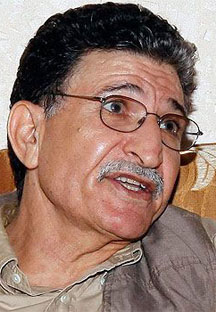TRIPOLI, (Reuters) – Defiant and angry, captured Libyan spy chief Bouzaid Dorda denied any wrongdoing when he was presented to Reuters reporters yesterday by the former insurgents who tracked him down in the capital Tripoli the previous day.
The latest high-profile insider of Muammar Gaddafi’s rule to be arrested, Bouzaid Dorda proved unapologetic about his role as head of the External Security Organisation (ESO) and suggested he was not ready to criticise the ousted autocrat just to please Libya’s new rulers.

And in heated exchanges at the private house where he was being held, he suggested the men who arrested him in the capital on Saturday had no right to the moral high ground.
“People have died from the two sides,” he shot back at a former fighter who remarked that many had died in the near seven-month-old Libyan conflict.
“You had two parties, one of them was an existing regime and the other was the people who rebelled against it and that’s the truth.”
As half a dozen men cradling assault rifles and wearing battle fatigues looked on, another fighter reminded him that he had served in several senior jobs for the ousted leader.
His voice echoing around the ground floor of the private house where he was being held, Dorda shouted: “I did not deny assuming any official post. Did I deny it? Did I deny it? Did I deny it? I was carrying out my duties.”
A Reuters team visited the house in the capital’s Zenata district where Dorda, a former prime minister and parliament speaker, was held by members of a unit of anti-Gaddafi fighters.
His captors had wanted to present Dorda to the media to prove their claim to have captured him.
As exchanges between him and his captors grew heated, any hopes of an interview faded.
DO OTHER TOP
FIGURES REMAIN
IN TRIPOLI?
Dorda said he was so angry about his questioning by his captors that he was not willing to address the media directly.
Reuters had hoped to ask him to explain why he took the risk of staying on in Tripoli three weeks after its fall. His captors said they did not know why he had stayed in the city. They said they had intercepted phone calls between him and members of Gaddafi’s family who had fled to the desert.
